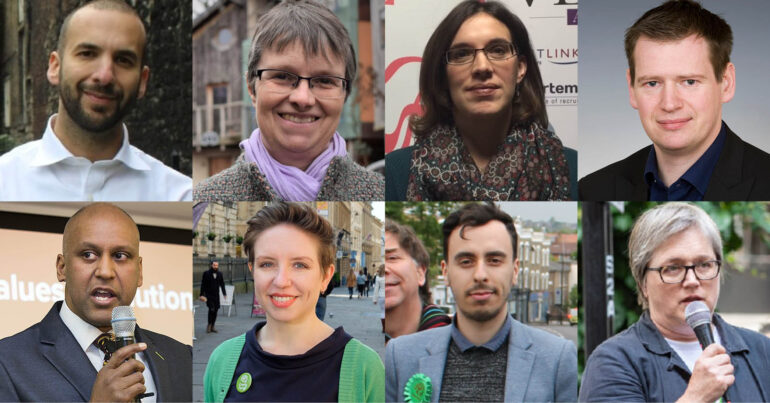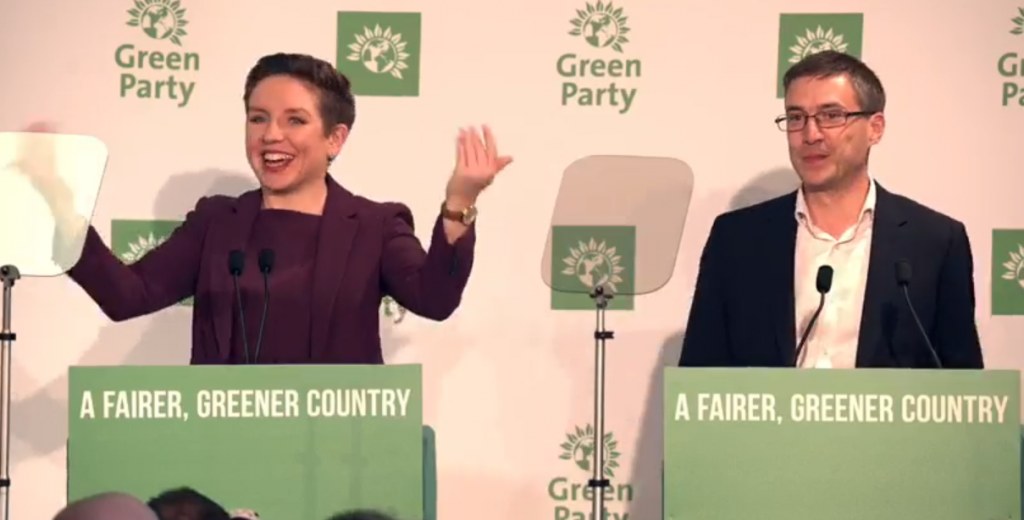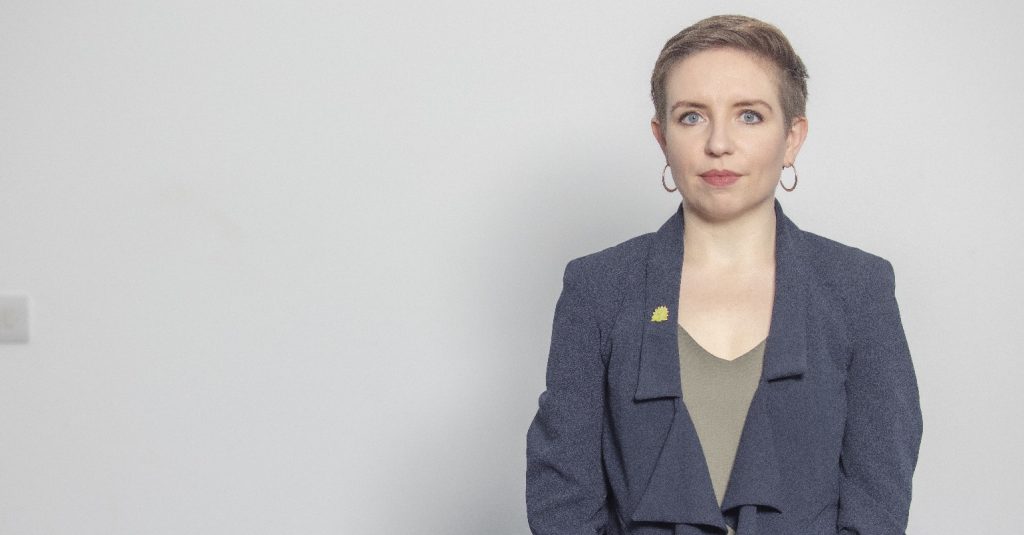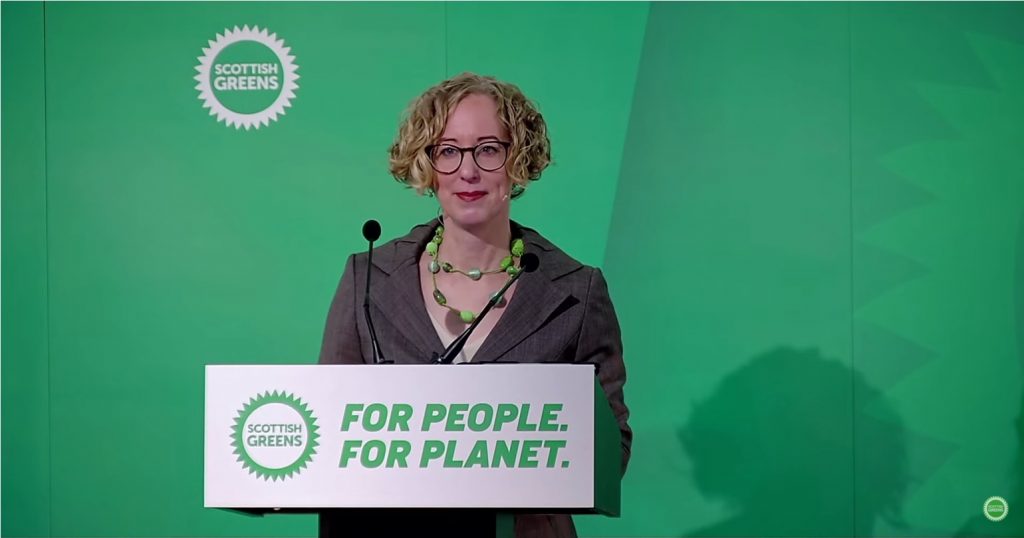Green Party announces new list of spokespeople

The Green Party of England and Wales has today announced a new list of spokespeople. According to the party, the list of 13 figures are “experts” who are “embedded into grassroots movements”, who will support the Greens’ leadership team in taking the party’s message to the public.
Green Party co-leader Jonathan Bartley revealed the spokespeople at Calthorpe Community Garden in Kings Cross, London this morning. Speaking on the announcement, Bartley claimed the team were “megaphones for a movement”. He said:
When people get involved in the Greens, it’s because we have a deep passion for the issues that we care about.
Our spokespeople are embedded into networks of grassroots activists and people who have the solutions to the problems we face, whether that’s the collapse of our ecosystems or the brutality of poverty.
These aren’t just spokespeople, we are megaphones for a movement of people who want real change.
The announcement comes just a month after the party achieved the second best local election results in its history. Greens made 99 gains in council contests this May, and added a third member of the London Assembly to their tally for the first time since 2000.
So who made the list?
The Greens’ new spokesperson list comprises some familiar faces, some newcomers and some who have come back into the fold after a few years of relative absence. Here’s the list:
Jack Lenox – Culture, sport and digital inclusion
Jack Lenox was recently elected as a Councillor in Lancaster in May’s elections, where he is now part of the ruling administration which took power from Labour. Lenox is a software developer by trade, having worked as principal engineer at Automattic and with a background in sustainable software engineering.
Zack Polanski – Democracy and citizen engagement
Zack Polanski was elected as the Greens’ third member of the London Assembly in May – joining Green Party co-leader Sian Berry and Caroline Russell in City Hall. During the campaign, Polanski was a vocal supporter of striking care home workers’ demands for fair pay and conditions. He has previously worked as an actor and a hypnotherapist, and was once a London Assembly candidate for the Liberal Democrats.
Molly Scott Cato – Finance and economy
Molly Scott Cato was a Green MEP for six years, representing the South West England region from 2014-2020. Her time in the European Parliament is perhaps best known to the public for her infamous put down of a Brexit Party MEP.
Scott Cato is a professor of green economics at Roehampton University, and has published a number of books including Green Economics, The Bioregional Economy: Land Liberty and the Pursuit of Happiness and the controversially titled Arbeit Macht Frei and Other Myths About Work.
Carne Ross – Global solidarity
Carne Ross worked for fifteen years in the foreign office as a diplomat. He resigned in 2004 after giving evidence to the first official inquiry into the Iraq War, in which he claimed that at no point in the run up to the war did the UK or US deem Iraq’s weapons to be a threat.
Ross has since set up the diplomatic advisory group Independent Diplomat.
Zoe Nicholson – Green New Deal
Zoe Nicholson is currently the deputy leader of Lewes District Council. She has previously served on the Green Party Executive in the position of management coordinator, and was the 2018 recipient of the Sussex Business Woman of the Year Award.
Peter Cranie – Health, social care and public health
Peter Cranie is a university lecturer and active member of the UCU union. Active in the Green Party since 2002, he was the lead candidate for the Greens in the 2009 and 2014 European Elections in North West England. In 2009 he came just 5,000 votes short of being elected and preventing then BNP leader Nick Griffin from taking a seat.
In 2012, Cranie also ran for the leadership of the Greens, coming second to Natalie Bennett. Cranie picked up 41% of the vote to Bennett’s 59% in the final round of counting.
Carla Denyer – Housing and communities
Carla Denyer is a Councillor in Bristol and was the Greens’ candidate in Bristol West in the 2019 General Election, coming second and picking up 25% of the vote. On Bristol City Council, Denyer proposed the first motion to declare a climate emergency in Europe, which committed the city to reach carbon neutrality by 2030.
Denyer has also worked as a renewable energy engineer, specialising in both onshore and offshore wind technology.
Vix Lowthion – Lifelong education
Vix Lowthion has stood three times as the Greens’ parliamentary candidate in the Isle of Wight – in 2017 receiving the second highest vote share of any Green candidate in the country. She has been the Greens’ education spokesperson since 2016, over which time she has built relationships with the UK’s teaching unions.
Lowthion also works as a secondary school teacher.
Benali Hamdache – Migration and refugee support
Benali Hamdache is a previous co-chair of the LGBTIQA+ Greens and was fourth on the Greens’ list for the 2021 London Assembly elections. He was also the Greens’ campaign manager for that Assembly campaign, as well as for the concurrent Mayoral campaign.
Hamdache’s has held a number of jobs in campaigns and the third sector, including a stint working for Britain Stronger in Europe during the 2016 EU referendum.
Jonathan Elmer – Natural world
Jonathan Elmer is a newly elected Green Party councillor in Durham. Elmer has worked as a consultant ecologist and is a member of the Institute of Ecology and Environmental Management.
Shahrar Ali – Policing and domestic safety
Shahrar Ali served a term as deputy leader of the Green Party from 2014-2016. He unsuccessfully stood for re-election in 2016, coming third behind Amelia Womack and Andrew Cooper. He has since stood to be the party’s leader, coming second in 2018 and third in 2020. In both contests he lost out to the co-leadership bid of Jonathan Bartley and Sian Berry.
Ali authoured the 2015 book Why Vote Green and was fifth on the Greens’ list for the 2021 London Assembly election. He also works at the Institute of Health Sciences Education at Queen Mary, University of London.
Caroline Russell – Transport and healthy streets
Caroline Russell has been a member of the London Assembly since 2016, where she leads the Greens on transport, the environment and the economy. She has also served as a Councillor in Islington since 2014. Throughout most of her term on the Council, she has been the sole opposition Councillor.
In 2018, Russell became chair of the London Assembly’s Environment Committee and has since led investigations into farming in the green belt, Heathrow’s proposed third runway and air pollution.
Catherine Rowett – Work, employment and social security
Catherine Rowett was a Green Party MEP from 2019-2020 and previously served as the party’s spokesperson on animal rights. She is currently the deputy coordinator of the Eastern Region Green Party and is a Professor of Philosophy at the University of East Anglia. Her academic work has focused on Ancient Greek philosophy, particularly the pre-Socratics and Plato.
Controversial appointment
Most of the appointments to the Greens’ list of spokespeople went ahead with little fanfare. However, Shahrar Ali’s appointment to the policing and domestic safety brief has proved controversial.
At the time of writing, the Green Party’s tweet announcing Ali’s position had attracted over 80 quote retweets. The vast majority of these highlight allegations of transphobia which Ali has faced over a number of years, most significantly during his second bid for the leadership of the party in 2020. During that campaign, he stood accused of having advocated a definition of women which was trans exclusionary, and his centreing of the “rights of women to same sex spaces” in his campaign launch led to allegations by some party members that he was engaging in a “transphobic dog whistle”.
This criticism of Ali’s appointment comes just a day after the party announced that Ross Peltier would be replaced as its candidate for the forthcoming Batley and Spen by-election following the uncovering of historic social media posts widely condemned as being homophobic and sexist. Among those criticising Ali’s appointment, many complained of an apparent difference in approach in the treatment of Peltier and Ali.
One Green Party member making this connection implied Ali was “openly transphobic” and that the decision to appoint Ali was “appalling”:
The party showed that it was able to take swift action against prejudice in Batley and Spen so why is there such a HUGE failure to deal with those who are openly transphobic. It may be a small (but vocal minority) but we need decisive action, not appalling decisions like these. https://t.co/4ahhXCSO80
— Alex (@acatt1497) June 7, 2021
Kelsey Trevett, the equality and diversity officer for the Young Greens – the Green Party’s official youth wing – said that Ali was “unfit to represent the party” given his alleged attempts to “move the party backwards in [sic] regards to trans rights”:
I’ve been debating whether to say anything on this in a public capacity, but on reflection it’d be irresponsible to be silent. I feel that Ali is unfit to represent our party, given: the motions he’s brought to conference to move the party backwards in regards to trans rights; https://t.co/jucZIKecb1
— Kelsey Trevett (he/they) (@CouldBeKel) June 7, 2021
Another Green Party member – Martin Farley from Brighton – said he was “embarassed” and disappointed by the party’s decision:
For the first time ever, I am truly embarrassed by the actions of @TheGreenParty today.
This is a failure of process and governance and I cannot stress how disappointed I am. https://t.co/M02o3pDgtu
— Martin Farley🔰💚 (@martin_farley) June 7, 2021
And former Young Greens treasurer Lucas North described Ali as an “open and current bigot”:
You literally did not need to give him a role. You suspended a by-election candidate for historic bigotry yesterday, and have promoted an open and current bigot today. https://t.co/W8kktll9sr
— Lucas (@lucasadnorth) June 7, 2021
Responding to these allegations, Ali said he was “humbled” to have been appointed as a spokesperson and said he would fight for the rights of LGBTIQA+ people. He told Bright Green:
I have fought for the human rights of the marginalised and voiceless in our society for decades, and will continue to do so, for the LGBTIQA+, disabled and ethnic minority communities and for the rights of women and children, too.
I will engage with all who wish to have a mature, respectful debate about equalities legislation or the impact of its reform on the well-being of all, within the best tradition of green politics.
I am proud that our party allows the space for debate on sometimes complex matters, just as wider society often falls short in terms of misrepresentation or groupthink about people and politicians. I feel humbled to have been entrusted to serve as a Green Party spokesperson.
Following the controversy, the Green Party was approached for comment. A spokesperson told Bright Green that all of the newly selected spokespeople – including Ali – had signed a code of conduct committing them to “fairness, tolerance, equality, diversity and inclusiveness”. They said:
The Green Party is unequivocal in its support for trans rights. We recognise that trans women are women, trans men are men, and that non-binary identities exist and are valid.
Each spokesperson has been appointed following a process open to all members who were invited to apply for one of the roles. Each applicant was assessed according to key criteria including expertise on the issue and media experience before a small group of elected representatives made the final decision.
All of the speakers will be acting subject to a code of conduct they have signed. This requires them to live up to our high standards of fairness, tolerance, equality, diversity and inclusiveness and to adopt a tone that is positive and inclusive and the party will ensure they live up to those standards.
This statement draws on existing party policy, which was strengthened expanded earlier this year, when Green Party conference voted in favour of a motion which supported the introduction of self-identification for gender recognition certificates.
Prominent party figures have also been vocal in their support for trans rights. In her London Mayoral campaign, Sian Berry pledged to make London the “most trans-inclusive city in the world”.
Bright Green has approached the LGBTIQA+ Greens for comment.
PS. We hope you enjoyed this article. Bright Green has got big plans for the future to publish many more articles like this. You can help make that happen. Please donate to Bright Green now.




Who selected these people?
What who approved them?
Deplorable reporting re Shahrar Ali
I am still confused. Did I miss the vote for appointing these new spokespeople?
Oh dear. What some of those anti Shahrar Ali people have said about him is just twisted. He supports women’s rights. Many trans people do and would not support the silly comments made about him. In fact many are as sick of gender ideology as the rest of us.
These disputes, which for many of us actually highlight high degrees of misogyny in the party, take time and energy away from the pressing issue of climate chaos.
It’s depressing to see.
Typo in my post of a second ago. It should read ” open and current bigot.”
I am very glad to have voted for ecosocialist Shahrar Ali as leader of the Greens in 2020.
++++++++++++++++++++++++
To call someone like Shahrar an “open and concerted bigot” is not only an outrageous smear,but libelous. Trust me: I have been a journalist since 1965 and taught law for 16 years.
It is an outrageous smear. Why do people think its OK to say such things?
Rather an unbalanced selection of comments about the choice of Shahrar Ali. If the definition of transphobia means supporting the idea that some facilities are reserved for cis women only, then Ali is not alone. Eric Walker